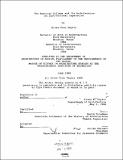| dc.contributor.advisor | David Friedman. | en_US |
| dc.contributor.author | Taylor, Rives Trau | en_US |
| dc.contributor.other | Massachusetts Institute of Technology. Dept. of Architecture. | en_US |
| dc.date.accessioned | 2013-03-28T18:00:51Z | |
| dc.date.available | 2013-03-28T18:00:51Z | |
| dc.date.copyright | 1988 | en_US |
| dc.date.issued | 1988 | en_US |
| dc.identifier.uri | http://hdl.handle.net/1721.1/78082 | |
| dc.description | Thesis (M.S.)--Massachusetts Institute of Technology, Dept. of Architecture, 1988. | en_US |
| dc.description | Includes bibliographical references (leaves 256-268). | en_US |
| dc.description.abstract | The architectural form of the American college campus is shaped by broader cultural and philosophical factors which themselves are based on the notion of an architectural environment able to control the intellectual growth of the individual. This thesis investigates the artistic and philosophical preconceptions of the profession of architecture during the American period of 1880 to 1920 using the college campus of Carnegie-Mellon University and the work o f Henry Hornbostel as the means of investigation. The architecture of the campus reflected the values and ideals of a diverse number of parties who were all interested in improving society along a "progressive" but conservative ideology. Their tools of reform were the Fine Arts and a system of higher education. They based this education on both a utilitarian pragmatism and a hegemony of cultural ideals. As they affect the campus form I will investigate the social ideals and the means to achieve those ideals as advocated by the patron Andrew Carnegie, by his lieutenants in Pittsburgh, by the city fathers of Pittsburgh, by the architectural profession (both the practicing and educational branches), by the wider academic community, and by the architect himself. This thesis investigates the notion of the Institutional Imperative in America at the turn of the century so to understand both the evolution of American civic architecture and the process whereby the individual architect made his formal decisions with respect to his larger philosophies and national context. | en_US |
| dc.description.statementofresponsibility | by Rives Trau Taylor. | en_US |
| dc.format.extent | 268 leaves | en_US |
| dc.language.iso | eng | en_US |
| dc.publisher | Massachusetts Institute of Technology | en_US |
| dc.rights | M.I.T. theses are protected by
copyright. They may be viewed from this source for any purpose, but
reproduction or distribution in any format is prohibited without written
permission. See provided URL for inquiries about permission. | en_US |
| dc.rights.uri | http://dspace.mit.edu/handle/1721.1/7582 | en_US |
| dc.subject | Architecture. | en_US |
| dc.subject.ddc | 727.3 | en_US |
| dc.title | The American college and its architecture : an institutional imperative | en_US |
| dc.title.alternative | College and its architecture, The American | en_US |
| dc.type | Thesis | en_US |
| dc.description.degree | M.S. | en_US |
| dc.contributor.department | Massachusetts Institute of Technology. Department of Architecture | |
| dc.identifier.oclc | 18902866 | en_US |
